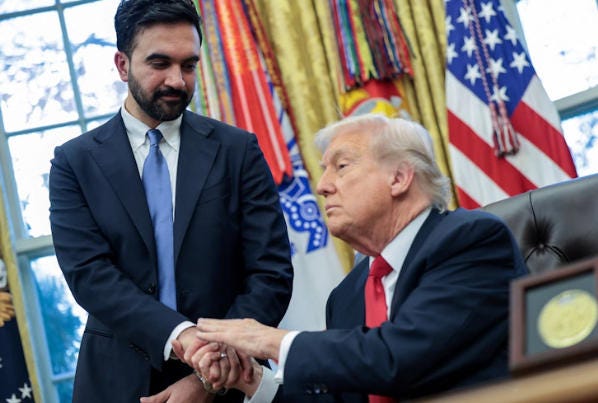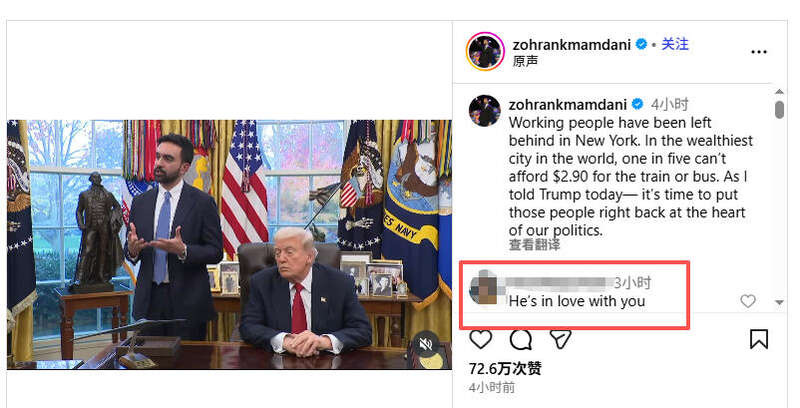Trump’s Meeting With Mamdani: The Limits of American Democratic Socialism
Why the system embraces these figures but never fears them
A warm White House moment that reveals a colder reality
The image of Donald Trump sitting in the Oval Office laughing with New York’s new mayor Zohran Mamdani shocked the country. Two weeks earlier, they were exchanging insults. Suddenly, the media described their meeting as “warm,” “surreal,” and even a “love fest.”
This dramatic shift has nothing to do with political maturity or bipartisan unity. It is a classic example of how the American political system reacts when pressure from below becomes dangerous. When living costs rise, inequality widens, and public frustration reaches a breaking point, the ruling class deploys one of its oldest stabilizing tools. They generate a symbol of hope, give it a spotlight, and present it to the public as proof that “change is still possible.”
Mamdani’s moment in the White House is not a breakthrough. It is a management strategy.
Hope is not natural; it is manufactured
Many people think hope emerges from visionary politicians, but in capitalism, hope is engineered. The ruling class understands that despair leads to action, and action threatens the structure. This is why they will never let the public fall into complete darkness. Instead, they offer controlled light, precisely when the system needs to cool down tensions.
Hope becomes a form of governance, a technique of emotional regulation. It is not meant to empower the public. It is meant to postpone their anger, stretch out their patience, and stabilize the system.
Mamdani was chosen because he is the perfect vessel for this type of hope. He appeals to working-class frustrations, but he poses no real threat to the deeper architecture of power. The system can praise him without fear, because he fits within its boundaries.
Democratic socialism’s limitations are not personal failures but structural design
To understand why, we need to recall a familiar pattern. In the late 19th century, Europe’s Second International believed that parliamentary reforms and social legislation could redirect capitalism toward socialism. Their idealism collapsed the moment World War I began. These parties quickly aligned with their national governments and supported sending workers into the trenches to kill each other.
This was not betrayal. It was absorption. The system did not change because of them; they changed to protect the system.
Today’s American democratic socialists follow the same trajectory. They enter institutions, gain visibility, and receive media attention, but their influence remains confined by what the structure allows. They can advocate for reforms, but they cannot alter the underlying logic of capitalism. Their purpose becomes symbolic more than transformational.
Democratic socialism is not an accidental victim of co-optation. It is built to be co-optable.
Trump’s embrace of Mamdani exposes the system’s confidence
When Trump praises Mamdani, defends him from reporters, and performs gestures of fatherly warmth, the message is not about the two men. It is about the system’s deep confidence in its ability to absorb dissent. This scene is designed to reassure the public that reform is underway, that the government still responds to working-class pain, and that waiting is better than acting.
In other words, hope is deployed to manage instability.
Not to solve it.
The system embraces figures like Mamdani because they absorb frustration without altering power. They offer progress without risk. They slow down anger, making it manageable. This is why the ruling class treats democratic socialists as safety valves rather than threats.
Reform cannot penetrate the structure
Democratic socialists fight for housing, healthcare, and workers’ rights. These goals matter, but they confront a system that is designed to channel reform into bureaucratic dead ends. Capital, lobbying networks, financial institutions, and national security interests define the limits of what is politically possible. These limits are not negotiable.
Reform can win programs but cannot rewire the architecture of power. It can ease suffering but cannot dismantle the causes of suffering. It can calm the public but cannot change the structure that produces crises in the first place.
This is why democratic socialism always returns to the same paradox. It produces hope, but that hope is controlled. It offers progress, but that progress is symbolic. It promises transformation, but that transformation never arrives.
Conclusion: When hope becomes a stabilizing tool, real change becomes distant
A society that relies on hope to maintain stability is a society already in crisis. Democratic socialists provide relief, but relief is not liberation. They can warm the political landscape, but warmth does not equal structural power. They can create the illusion of a better tomorrow, but illusions do not alter systems.
People continue to believe in democratic socialism because hope feels better than despair. But hope itself becomes a mechanism of governance, a polite barrier between genuine anger and genuine action.
Mamdani’s White House moment is not the beginning of change. It is the system demonstrating once again that it can absorb any challenge as long as the challenge stays polite.
Real change begins when people stop mistaking hope for power.



Thank you for very interesting perspective. Sounds like you are right about mamdani not being a real threat to trump, and being a sort of pressure release for this terrible moment for trump. I will re read and learn more. New subscriber